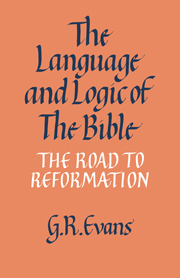Book contents
- Frontmatter
- Contents
- List of abbreviations
- List of sources
- Biographical notes
- Introduction
- I Scripture's divine warrant
- 1 ‘Scripture hath for its author God himself’
- 2 The human authors of Scripture
- 3 Handing on and explanations
- 4 Sola scriptura
- 5 Towards private judgement: ‘The children of God spy out their father’
- II The rules of interpretation
- III Practical interpretation
- Conclusion
- Notes
- Select bibliography
- Index
5 - Towards private judgement: ‘The children of God spy out their father’
from I - Scripture's divine warrant
Published online by Cambridge University Press: 12 October 2009
- Frontmatter
- Contents
- List of abbreviations
- List of sources
- Biographical notes
- Introduction
- I Scripture's divine warrant
- 1 ‘Scripture hath for its author God himself’
- 2 The human authors of Scripture
- 3 Handing on and explanations
- 4 Sola scriptura
- 5 Towards private judgement: ‘The children of God spy out their father’
- II The rules of interpretation
- III Practical interpretation
- Conclusion
- Notes
- Select bibliography
- Index
Summary
It had been a matter of only moderate concern to the scholars of the earlier Middle Ages how the laity were to go on in the faith with only a limited knowledge of it. In the mid-twelfth century Simon of Tournai thought it enough that they should look on what they could not understand with reverence and awe, in the assurance that they were being brought to salvation.
Behind that confidence that the outcome was securely in God's hands lay long tradition that the Holy Spirit is the educator of men's hearts. The visions of the saintly abbess Hildegard of the same period came to an uneducated mind, she says; but they came in the form of Biblical imagery and she was enabled to write about them with impressive fluency and – in time – with learning. The simple laity were not granted the same understanding, but they were kept on the right road of the soul by the Holy Spirit just as Hildegard and the other holy women of the later Middle Ages were.
The movement to translate the Bible into the vernacular and to put it into the hands of the laity was to extend that principle to apply to all Christians. As Calvin puts it: The same Spirit who made Moses and the prophets certain of their calling, has now testified to our own hearts.’
Robert Bellarmine points to a danger: ‘Is only that which the Holy Spirit says privately to each in his heart to be received as the Word of God?’ He sees human judgement of what is thus taught it as ‘often deceptive and always uncertain’.
- Type
- Chapter
- Information
- The Language and Logic of the BibleThe Road to Reformation, pp. 33 - 36Publisher: Cambridge University PressPrint publication year: 1985



